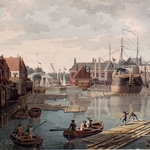Balance between City and Countryside in the Netherlands
DOI:
https://doi.org/10.18352/bmgn-lchr.8150Keywords:
Economic development, urbanisationAbstract
The Low Countries are seen as one of the few European regions in which a relatively large number of cities developed at an early date. Generally this urbanisation is understood to be a result of a process of commercialisation and specialisation, and in the view of some this urbanisation might have continued into modern industrial times. However in the Netherlands, as elsewhere, continuous urban growth was not general before the mid-nineteenth century. Why some cities experienced growth while others languished remains an interesting and relevant question. In this article some recent studies on urban decline in the Low Countries are evaluated. Why and where did this happen and what were the societal consequences of de-urbanisation? Three studies on Zeeland form an intriguing starting point for a discussion on decline in Dutch urban development that could be seen as a-typical, but is arguably part of the regional and temporal variety of the Dutch society in the eighteenth and nineteenth centuries.Downloads

Downloads
Published
Issue
Section
License
Authors who publish with this journal agree to the following terms:
a) Authors retain copyright and grant the journal right of first publication with the work simultaneously licensed under a Creative Commons Attribution 4.0 International (CC BY 4.0) that allows others to share the work with an acknowledgement of the work's authorship and initial publication in this journal.
b) Authors are able to enter into separate, additional contractual arrangements for the non-exclusive distribution of the journal's published version of the work (e.g., post it to an institutional repository or publish it in a book), with an acknowledgement of its initial publication in this journal.
c) Authors are permitted to post their work online (e.g., in institutional repositories or on their website) prior to and during the submission process.
Authors are explicitly encouraged to deposit their published article in their institutional repository.











